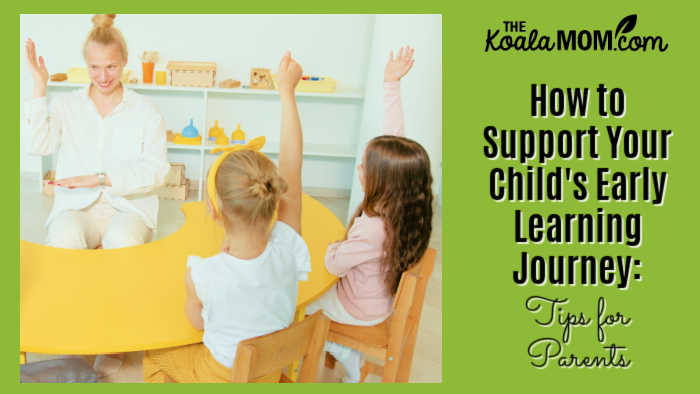Supporting your child’s early learning journey is one of the most rewarding and crucial roles you will ever have as a parent. The early years of a child’s life are often considered the foundation for future learning, behavior, and health. Children are like sponges during this stage, soaking up experiences, knowledge, and skills that will shape their cognitive and emotional development. As parents, it’s essential to guide this journey and provide the right tools and environment to succeed.
For parents seeking a more structured approach, excellent educational programs can help support their child’s growth—see here for more details.

This post contains affiliate links; as an associate, I earn from qualifying purchases.
Promote Curiosity and Exploration
Parents’ most significant role in supporting early readiness to learn is to create curiosity and exploration. Children are curious and want to acquire as much information as possible about their world. They question something millions of times, try something new, and study how the different parts of an environment work. Don’t immediately guide your child or tell her what to do or which buttons to press; let her discover things on her own.
You can make your home a learning environment by allowing children to explore. This could entail devising easy experiments, getting them books that meet their preferences, or letting them practice activities that will correct their way of thinking. A significant consideration is promoting more practical approaches. These activities do not have to be very complex or costly. Even gardening or baking can be a source of enormous learning about nature, math, and science.
At the preschool age, children learn a great deal just from playing. Toys such as the Lovevery play kits help them learn while playing and exploring, and provide parents with tips and ideas for encouraging further learning from the play. These play kits are durable and high-quality and provide hours of fun, educational, creative play for young children.
Exploring helps children gain critical thinking and problem-solving skills, and it helps create an atmosphere of exploration. Such attributes are important not only for academic achievement but also for personality development and for becoming more self-reliant.
Develop Good Language and Communication Skills
Another major domain in enhancing your child’s early learning is language and communication. As soon as your child is born, they start the process of learning how to communicate. Parents foster this development through conversations, reading aloud, and using new words often.
One of the most powerful means of helping your child develop language skills is reading to them on a daily basis. Select books that are close to their age, but you should not limit them to what they know. Books, reading books—particularly picture books—interactive stories, and even discussions about objects in the house will go a long way in improving their vocabulary and understanding.
Speak to your child as often as possible, even if the child is still an infant. Engage them in conversation, answer whatever they say, and encourage them to tell you more by asking them questions that require more than yes or no answers. Young children who experience an early language environment have better communication and language development as a foundation for education and other activities in life.
It is also useful to familiarize them with activities such as singing, telling stories, and pretending to be someone. All these practices help boost kids’ language skills and inculcate creativity and social skills.
Build a Pattern which Promotes Learning
As much as possible, children require familiar schedules and routines to be comfortable. Creating a schedule of the times that your child should play, learn, and rest can go a long way in helping your child. This structure doesn’t have to be set in stone, but it is beneficial if children have some sense of structure to place their learning and trust.
You can plan the day and divide it into learning activities and time to play in the way that will suit your child best. For instance, doing a reading or educational game in the morning and then getting into an art project in the afternoon can make learning manageable. Routines also allow you to teach a new concept, such as counting, shapes, colors, or writing.
Just as important is the environment, which should be conducive to learning. This means that the learning area should be free from clutter. This could be a small corner with books and a chair for young children, a work table for painting or drawing and so on as they advance in age, or a study table. The idea is to provide conditions for work that would allow students to concentrate on their work without interruptions.
Provide the Right Learning Resources
Equipping your child with the right learning resources is essential in fostering their educational growth. The materials you provide should be engaging, age-appropriate, and aligned with their interests and learning style. A variety of tools, such as puzzles, building blocks, flashcards, and educational games, can enhance different areas of development, from fine motor skills to logical reasoning.
In addition to physical resources, incorporating digital learning tools can also be beneficial. Interactive educational apps and online programs can supplement traditional learning methods and keep children motivated. My kids have learned a lot through apps such as Homer, Starfall, and Reading Eggs. However, it’s crucial to strike a balance between screen time and hands-on activities to ensure a well-rounded learning experience.
For parents who prefer a more structured approach, specific curricula can be highly effective. The Montessori homeschooling mathematics curriculum, for example, provides hands-on learning materials that encourage independent problem-solving and conceptual understanding. This approach helps children develop a strong mathematical foundation in an engaging and meaningful way.
By offering the right mix of learning resources, you create an environment that nurtures curiosity, enhances cognitive skills, and supports your child’s overall educational journey.
Promote Emotional Growth
Emotional learning is a crucial part of the early learning process in children. In other words, students with secure attachments have better chances of handling the odds life throws at them, making friends, and performing well in school. As a parent, you need to accept their feelings and guide them in the right manner.
As young ones learn, they tend to follow the example of their parents, so it is essential to be there for them and show them the correct response. If your child is upset because they could not complete a task satisfactorily, just comfort them and tell them it’s alright to make mistakes. Encourage them for the work they have done, not the result achieved. This assists them in developing a coping mechanism and growth mindset because they know that learning is a process, not an event.
Further, it is useful to arrange social contacts with peers or relatives and encourage communication with them. Play dates, group activities, or even simple role-play can teach children proper conduct in groups or even simple interpersonal relations, like sharing, feeling for others, and cooperation.
Helping your child learn when they are young is not just about counting, writing, and recognizing letters; it is about assisting them to explore the world, learn to express themselves, have a schedule to follow, and understand their feelings. The child’s initial education is from parents, and the things you teach your children now will follow them throughout their lives.
Remember that every child is an individual, and learning takes place in many ways. In other words, when you do not lose your temper, pay attention, and provide a nurturing home, you provide your child with the best opportunity to succeed.


No Responses Yet